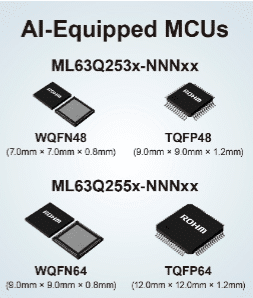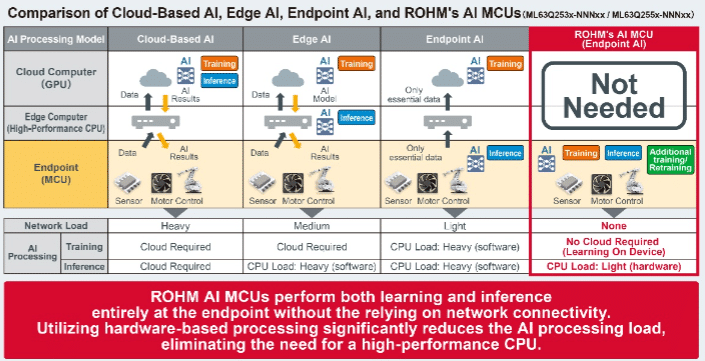The industry’s first MCU to perform on-device learning and inference for equipment anomaly prediction—completely independent of a network connection.

ROHM has announced the launch of AI-equipped microcontrollers (AI MCUs), the ML63Q253x-NNNxx and ML63Q255x-NNNxx series, designed to enable real-time fault prediction and degradation forecasting in a variety of devices, including industrial motors and home appliances. These AI MCUs are the industry’s first to support both learning and inference independently—eliminating the need for cloud connectivity or high-performance CPUs.
This innovation addresses growing industry demands for network-independent predictive maintenance, offering a robust solution to minimize downtime and maintenance costs while boosting operational efficiency. At the core of these MCUs is the company’s proprietary Solist-AI solution, which uses a lightweight 3-layer neural network to perform on-device learning and inference. Unlike typical cloud or edge AI systems that rely on external infrastructure, the MCUs operate fully offline, delivering fast, adaptive anomaly detection across various deployment scenarios.

The key features are:
- Features AxlCORE-ODL AI accelerator for ultra-fast processing
- Delivers up to 1,000x faster AI performance vs. previous software-based MCUs (at 12MHz)
- Supports real-time anomaly detection and high-speed on-site learning
- Ideal for retrofitting as well as integration into new systems
- Built on 32-bit Arm Cortex-M0+ core
- Includes CAN FD, 3-phase motor control PWM, and dual A/D converters
- Achieves low power consumption (~40mW)
The company plans to offer a lineup of 16 AI MCU variants, each tailored with different memory sizes, pin counts, and package options to meet diverse application needs. To support developers, it has introduced the Solist-AI Sim tool, which enables simulation-based evaluation and training data generation before actual deployment. The company is expanding its AI ecosystem through collaborations with partner companies, providing comprehensive support for model development, integration, and training. With these new AI MCUs, the company is driving the advancement of intelligent, standalone devices across both industrial and consumer sectors.








